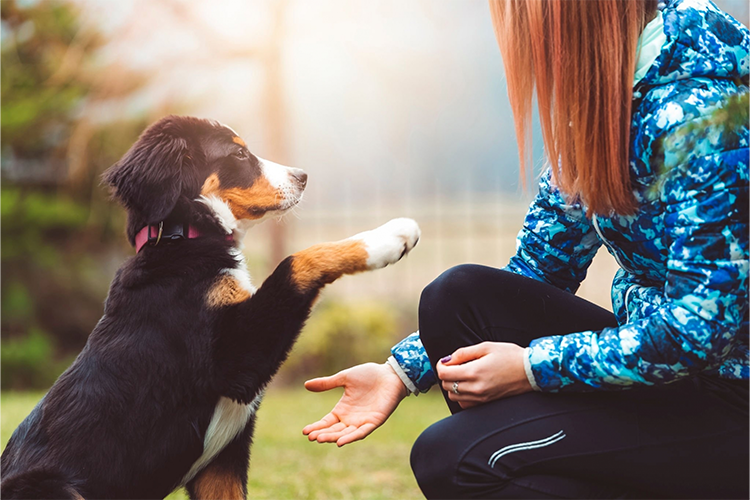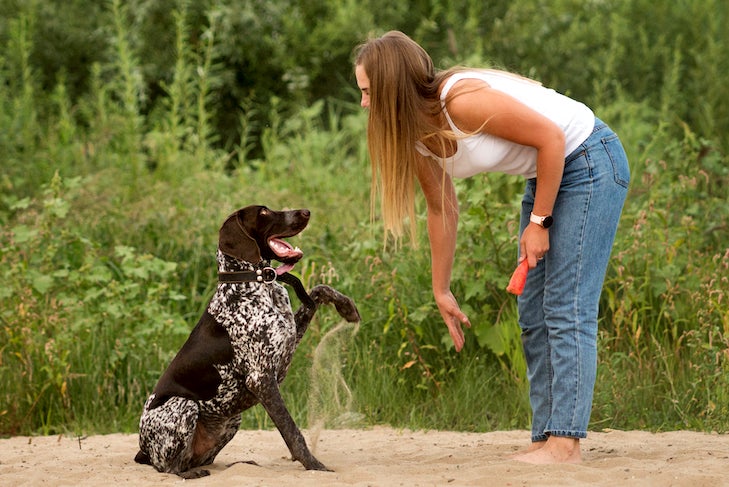Specialist Insights on Dog Training Charlotte NC: Change Your Dog Today
Unlock Your Pet dog's Prospective: Proven Pet Dog Training Strategies for Success
Effective dog training is a nuanced process that pivots on understanding canine actions and utilizing medically backed strategies. By including positive support, establishing clear commands, and prioritizing socializing, canine owners can grow an efficient partnership with their pets.
Comprehending Pet Dog Behavior
Comprehending pet dog habits is vital for efficient training and fostering a positive connection in between dogs and their proprietors. A detailed understanding of canine body language, vocalizations, and social communications is vital for identifying their requirements and emotions. Pets interact mostly with non-verbal cues; for instance, a wagging tail might indicate enjoyment, while pinned ears can indicate worry or submission.

Additionally, environmental elements play a significant duty in shaping a dog's habits. Modifications in routine, brand-new environments, or the existence of unfamiliar people can result in stress and anxiety or anxiousness in pet dogs. Recognizing these triggers allows owners to mitigate negative reactions and develop proper training approaches.
Ultimately, a deep understanding of pet actions lays the structure for successful training techniques, improving both habits and the total bond in between the pet and its owner. dog training charlotte nc. This expertise is indispensable for fostering a well-adjusted, pleased canine companion
Positive Reinforcement Techniques
Effective training counts greatly on positive support techniques, which have actually been shown to generate considerable cause shaping wanted behaviors in pets. This technique involves awarding a dog for displaying specific habits, consequently enhancing the chance that these habits will certainly be repeated. Benefits can take different kinds, including deals with, praise, playthings, or playtime, depending upon what encourages the private pet.

It is necessary to gradually terminate incentives as the pet dog learns the actions, transitioning to recurring support. This technique maintains the actions gradually while avoiding dependency on consistent benefits. By concentrating on favorable reinforcement, instructors can grow a trusting partnership with their canines, advertising a participating and healthy training setting that improves total obedience and performance.
Developing Constant Commands
A fundamental element of successful pet dog training is the establishment of constant commands. Consistency in commands is vital for effective interaction between the instructor and the dog. When commands are consistent, dogs discover to link particular words with wanted behaviors, which accelerates the training procedure and enhances understanding.
To establish regular commands, it is vital that all member of the family utilize the very same terminology and gestures. If one individual uses "sit" while one more says "sit down," it can produce complication for the pet. Select clear, distinct words for commands and make sure every person involved in the canine's training abides by these selections.
In addition, repetition is essential. Strengthen commands via constant practice, guaranteeing that the canine gets enough possibilities to respond appropriately. When a pet dog efficiently complies with a command, instant favorable support needs to adhere to. This could be in the type of treats, praise, or playtime, solidifying the connection between the action and the command.
Last but not least, be person. Developing regular commands requires time and initiative. With commitment and clarity, you will aid your pet check out here create a solid understanding of assumptions, eventually resulting in a well-behaved friend.
Socializing and Exposure
Socializing a dog is essential for cultivating a positive and well-adjusted companion. This procedure includes subjecting your dog to a selection of atmospheres, people, and various other animals to develop their social abilities and versatility. Early socializing, ideally in between the ages of three to fourteen weeks, is essential, as it lays the groundwork for a pet dog's future behavior.
Throughout socialization, purpose to supply positive experiences in various settings, such as parks, active streets, and homes with various other animals. Present your pet dog to various stimulations, including audios, sights, and scents, guaranteeing that each experience is visit their website gratifying. This direct exposure assists minimize worry and anxiousness, leading the way for a much more resistant canine.
Engaging in controlled group play sessions with other canines can likewise boost social abilities, teaching your pet suitable interactions and limits. Focusing on socializing will dramatically add to your pet dog's total joy and actions throughout their life.
Overcoming Common Educating Obstacles

One more frequent problem is distraction. Pet dogs might have a hard time to concentrate in unfamiliar or hectic settings. browse around here Slowly desensitize your pet to interruptions by beginning training in a quiet setting and slowly introducing even more stimuli as they end up being skillful (dog training near me). Favorable reinforcement methods, such as deals with and appreciation, can maintain motivation and emphasis.
Additionally, behavioral issues like jumping or extreme barking can come to be irritating. Address these by teaching alternative behaviors, such as sitting calmly when greeting guests. Consistency and patience are important; strengthen preferred actions continually and stay clear of abuse, which can bring about confusion.
Last but not least, recognize that each canine is special, and training timelines might vary. Tailor your method to your canine's private requirements, and seek professional guidance if necessary. With perseverance and the appropriate methods, conquering these challenges can lead to a trained, delighted canine buddy.
Final Thought
To conclude, unlocking a dog's possible demands a thorough technique that integrates an understanding of canine behavior, the application of positive support methods, and the establishment of consistent commands. Early socializing and direct exposure to diverse environments better improve a canine's adaptability and self-confidence. By attending to common training obstacles with customized techniques and patience, a participating and unified relationship in between canine and handler can be cultivated, ultimately causing a well-behaved companion with the ability of flourishing in numerous circumstances.
Effective pet dog training is a nuanced process that pivots on understanding canine actions and employing medically backed techniques.Recognizing canine actions is necessary for effective training and promoting a positive connection in between canines and their proprietors.Effective training depends heavily on positive support techniques, which have actually been revealed to yield substantial results in shaping wanted behaviors in canines. When commands are consistent, dogs discover to link particular words with wanted actions, which speeds up the training procedure and boosts understanding.
In conclusion, unlocking a pet's potential requires a thorough approach that integrates an understanding of canine habits, the application of favorable support techniques, and the establishment of constant commands.